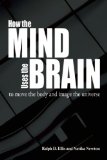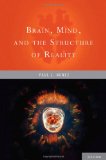Douglas Hofstadter (‘Godel, Escher, Bach,’ ‘I Am a Strange Loop’) and David Chalmers (‘The Conscious Mind’) have new books coming out later this year, something to look forward to, or preorder as a gift to your future self…

The Character of Consciousness (Philosophy of Mind) by David Chalmers (Oxford University Press, 2010) has a US publication date of Aug 12 according to Amazon, or July according to the publisher. The publication date is also listed as Aug 2010 at Amazon.co.uk.
Product description from the publisher:
What is consciousness? How does the subjective character of consciousness fit into an objective world? How can there be a science of consciousness? In this sequel to his groundbreaking and controversial The Conscious Mind, David Chalmers develops a unified framework that addresses these questions and many others. Starting with a statement of the “hard problem” of consciousness, Chalmers builds a positive framework for the science of consciousness and a nonreductive vision of the metaphysics of consciousness. He replies to many critics of The Conscious Mind, and then develops a positive theory in new directions. The book includes original accounts of how we think and know about consciousness, of the unity of consciousness, and of how consciousness relates to the external world. Along the way, Chalmers develops many provocative ideas: the “consciousness meter”, the Garden of Eden as a model of perceptual experience, and The Matrix as a guide to the deepest philosophical problems about consciousness and the external world. This book will be required reading for anyone interested in the problems of mind, brain, consciousness, and reality.
Hofstadter’s new book with co-author Emmanuel Sander, Surfaces and Essences, also referred to as The Essence of Thought, is due out June 2 according to Amazon, but publisher Basic Books indicates a publication date of Sept 27. May 6 is the pub date shown at Amazon.co.uk.
Product description from the publisher:
Is there one central mechanism upon which all human thinking rests? Cognitive scientists Douglas Hofstadter and Emmanuel Sander argue that there is. At this core is our incessant proclivity to take what we perceive, to abstract it, and to find resemblances to prior experiences—in other words, our ability to make analogies.
In The Essence of Thought, Hofstadter and Sander show how analogy-making pervades our thought at all levels—indeed, that we make analogies not once a day or once an hour, but many times per second. Thus, analogy is the mechanism that, silently and hidden, chooses our words and phrases for us when we speak, frames how we understand the most banal everyday situation, guides us in unfamiliar situations, and gives rise to great acts of imagination.
We categorize because of analogies that range from simple to subtle, and thus our categories, throughout our lives, expand and grow ever more fluid. Through examples galore and lively prose peppered, needless to say, with analogies large and small, Hofstadter and Sander offer us a new way of thinking about thinking.








